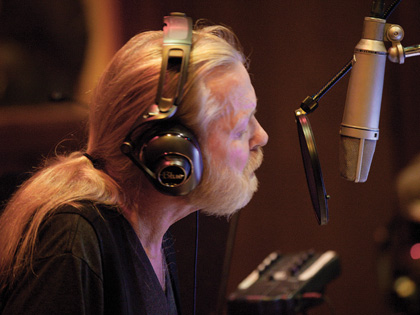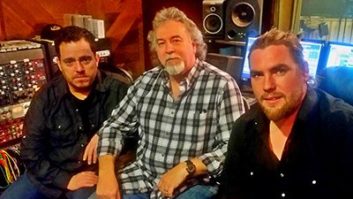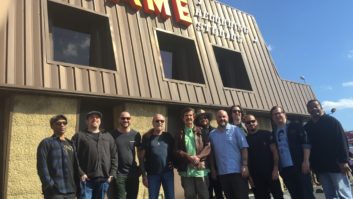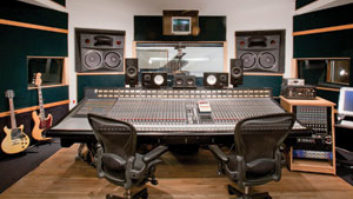
Gregg Allman passed away in May, but he left behind an eternal musical legacy.
Southern Blood, Allman’s farewell gift to fans and loved ones, is meant to tell the story of his life. Soulful, spirited, vulnerable and defiant, it’s a profoundly moving, honest reflection on his experiences, good and bad, and his feelings about leaving the world.
The album was recorded at Muscle Shoals’ legendary FAME Studios, produced by Don Was and recorded by Don Srygley, with assistance by John Gifford III and Spencer Coats.
For Allman, returning to Muscle Shoals was coming full circle to the place where he and his brother, the late guitar great Duane Allman, cut some of their earliest tracks nearly 50 years ago.
“He’s tried to have a connection with Duane through his career,” says FAME general manager Rodney Hall. “He wanted to come back and do what he knew was going to be his final album.”

Band and crew members: Ron Johnson, Pete Levin, Jay
Collins, Allman, Rick Hall, Don Was, Art Edmaiston, Scott
Sharrard, Marc Quinones, Marc Franklin and Steve Potts.
Still, Was notes, “Even though there is an unusual amount of gravitas attached to this particular album, the producer’s role didn’t stray too far from basic principles. You’re there to help the artist realize his vision: Make sure the songs are great and that the artist has room to phrase with a full range of expression.”
Southern Blood’s ten tracks—including songs written by Bob Dylan, the Grateful Dead, Willie Dixon, Lowell George and Jack Avery—speak to Allman’s roots in blues, country, soul and rock.
It’s an expansive range of styles, yet a cohesive, organic feel permeates the tracks, unified by Allman’s transcendent vocals, live performances by Allman’s longtime touring band and the signature sound of the studio itself.
Sessions were cut live, through a Neve 8232 console to 2-inch tape. The musicians crowded into Studio A, with most of the players on the floor; guitar amps were placed in a former echo chamber-turned-storage-room and miked with Shure SM57s, Royer 121s and an 87 placed back; the horn section packed around a single U87 microphone in another booth.
With up to 11 players in the room at one time, there was a lot of bleed—which was key to the sound of the record. “What you hear is what happened in the room,” says Srygley, who has recorded many sessions at FAME over the past 27 years. “I used as little EQ as possible; I just wanted to document it.”
The sessions pushed FAME’s channel inputs—and mic collection—to the limit. “It wasn’t like, ‘I want this mic here and this mic there,’” says Srygley. “It was like, whatever mic we have left, put it up. I had to swap mics back and forth because we were so short.”
As with so many iconic vocal recordings, capturing Allman was simple and straightforward. “Gregg was a badass singer—one of the all-time great American vocalists,” says Was. “He kinda spent his whole life specializing in raw expression…so, with a brilliant artist like that, you’re already way ahead of the game when the tape starts rolling.”
Allman sang in the main room when he played guitar or Hammond, and occasionally sang in a vocal booth, always aiming for a natural sound.
“Starting out, I had a favorite kind of vocal mic that I liked,” says Srygley. “It was a little too crisp and up-front for him; I basically ended up using an 87 on his voice.”

In FAME Studios, L-R: guitarist/musical director Scott
Sharrard, Allman and engineer Don Srygley.
Allman’s vocals were sent through the console preamp and a Tube-Tech CL1-A compressor. An emotional moment came during the recording of the last verse of Jackson Browne’s “Song for Adam,” which was particularly dear to Allman because it reminded him of his brother. When he got to the line, “Still it seems that he stopped singing in the middle of his song,” he became too choked up to continue; everyone agreed to wrap for the day, but Allman never got the chance to finish singing the verses. “Leaving them open seemed like a poignant and poetic way for him to make his exit,” says Was.
Allman passed away in May from complications from liver cancer, so unfortunately he did not live to see Southern Blood released last month. “I know I’m lucky to have been able to work on this record,” says Srygley. “I’m really proud of the way it sounds.”
“Gregg was surrounded by a really supportive and generous cast of musicians, engineers, management and friends, and all of them played a significant role in this record,” Was says.
For Hall, son of FAME Studios founder Rick Hall, the studio’s role in this musical legacy has hit home in surprising ways. “My son is 17; he comes in and does jobs for us from time to time,” he says. “We were putting tapes away in the vault, and we had Gregg’s tapes. He said, ‘Where do you want to put them?’ And I said, ‘Well, put them there in alphabetical order; put them right there.’ And I realized he was putting Gregg’s tapes right next to Duane’s, and I got chills.”





